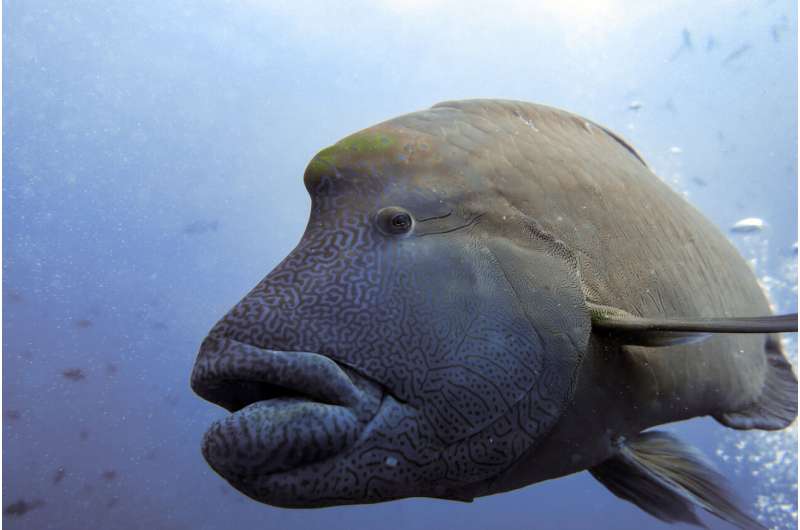
Warming and overfishing may change the position of fishes within the marine carbon cycle

Bony fish are extra typically acknowledged as meals sources than as carbon regulators. They supply an array of providers related to local weather change mitigation. For example, they retailer carbon inside their our bodies as they develop and export it to deep seas by means of their sinking feces and carcasses. However additionally they make carbonates from marine salts inside their guts and excrete them at excessive charges. This makes them particularly necessary inside the inorganic carbon cycle of the oceans.
With loads of fish within the sea, the significance of fish carbonates for the inorganic carbon cycle shouldn’t be underestimated. Fish carbonates can sink and develop into a part of sediments or dissolve and improve the water’s means to neutralize acids. They might due to this fact improve the ocean’s capability to buffer acidification. A brand new examine in Nature Communications sheds mild on the controls of carbonate excretion by fish. The findings advance our understanding of the biogeochemical and bodily processes within the ocean in instances of local weather change.
Led by the Leibniz Middle for Tropical Marine Analysis (ZMT), a staff of scientists studied all kinds of fish species to find out how sure fish traits and environmental modifications management the quantity and composition of excreted carbonates. The staff retrieved carbonates produced by fish from Palau, Australia and the Bahamas whereas preserving them inside aquaria in situations pure to their residence reef. The researchers then compiled an intensive database of carbonate excretion charges from greater than 380 coral reef fishes from 85 species, together with damselfish, surgeonfish, parrotfish, wrasses, snappers and groupers.
Why do bony fish excrete carbonates?
Marine fish stay in a salty surroundings that has a better osmotic stress than their blood. Consequently, their our bodies are disadvantaged of water. “To hydrate, the fish drink seawater, however they must do away with the big quantities of calcium and magnesium contained in it,” explains Mattia Ghilardi, a marine biologist on the ZMT and lead writer of the examine. “These are precipitated within the intestine within the type of carbonate crystals and launched into the ocean inside the feces.” Specialists estimate that fish feces account for 3–15% of worldwide carbonate manufacturing in ocean floor waters.
In contrast to corals and different carbonate producers, fishes create a large spectrum of carbonate kinds. Relying on their composition, these crystals can dissolve quickly within the water column, or sink and stay buried inside shallow coastal sands for a very long time, thus contributing to the formation of muddy sediments. International warming and overfishing can alter the quantity of carbonates produced by fishes, and in the end dictate which carbonate kind is excreted essentially the most. This may tweak utterly the position fish play within the ocean’s inorganic carbon cycle.
It has lengthy been assumed however not demonstrated that fish carbonate excretion is proportional to their metabolism. The scientists strongly confirmed this. Excessive temperatures, for instance, increase metabolism and carbonate excretion. Fish with forked or lance-shaped tails are extra lively and thus excrete extra carbonates than fish with rounded tails. Curiously, the size of the intestine additionally performs a task: like temperature, it impacts the quantity and mineralogical composition of the excreted crystals.
Modifications in marine chemistry attainable
International warming and the overfishing of sure fish species might considerably upset the contribution of fish carbonates to the marine inorganic carbon cycle. For instance, fishing stress on fish which are excessive up the meals chain may result in a pointy decline in carbonate excretion. Local weather-driven modifications in fish dimension might exacerbate this impact. Hotter temperatures favor the manufacturing of extremely soluble fish carbonates that kind much less sediment. All of those components affect marine chemistry and doubtlessly the ocean’s capability to buffer additional atmospheric CO2.
The brand new findings will allow researchers to extra reliably calculate the quantity and composition of carbonates produced by fish communities in several marine areas and worldwide. “With our examine, we pave the best way for extra correct predictions concerning the position of fish within the marine carbon cycle underneath altering situations akin to local weather warming and overfishing,” says co-author Sonia Bejarano, reef ecologist on the ZMT. “Such predictions are crucial for administration and decision-making processes aimed toward sustaining ecosystem features.”
Extra data:
Mattia Ghilardi et al, Temperature, species identification and morphological traits predict carbonate excretion and mineralogy in tropical reef fishes, Nature Communications (2023). DOI: 10.1038/s41467-023-36617-7
Offered by
Leibniz-Zentrum für Marine Tropenforschung (ZMT)
Quotation:
Warming and overfishing may change the position of fishes within the marine carbon cycle (2023, March 7)
retrieved 12 March 2023
from https://phys.org/information/2023-03-overfishing-role-fishes-marine-carbon.html
This doc is topic to copyright. Aside from any truthful dealing for the aim of personal examine or analysis, no
half could also be reproduced with out the written permission. The content material is offered for data functions solely.
